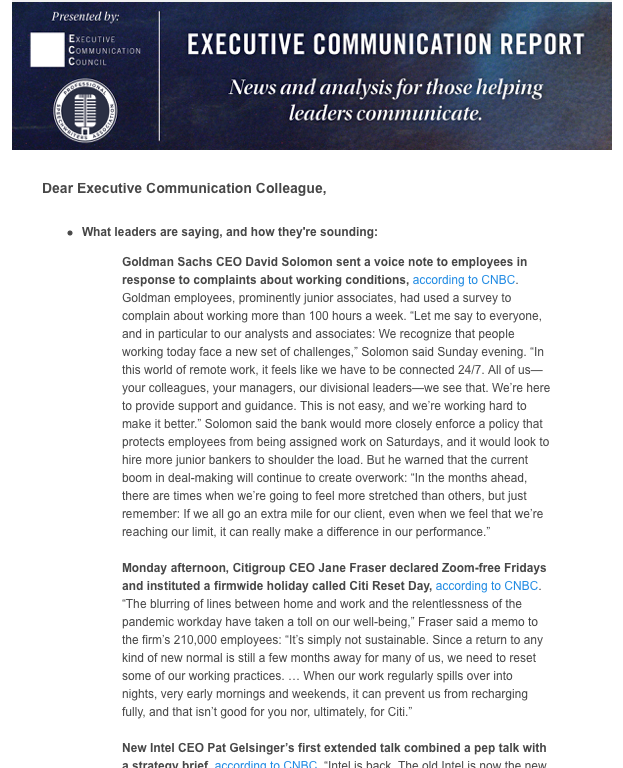Calling B.S. on straw-grasping CEOs
March 24, 2021
Corporate CEOs who blame employee burnout on "the world of remote work" and "the blurring of lines between home and work" may be fooling themselves, but they're not fooling anybody else.
In a year that began rhetorically with “we’re all in this together” and wound up emptily with “this isn’t who we are,” corporate CEOs have found another phony framing that we ought to call out before it gets out of hand (if it hasn’t already).
In this morning’s Executive Communication Report—a free, three-times-a-week newsletter to which every communicator should subscribe—we reported on two CEOs who on consecutive days issued urgent communications to employees.
See here:

Now, what do those communications have in common, aside from the fact that they both sound as if they’d been issued under duress?
They both seem to blame overwork on “the world of remote work,” as Goldman Sachs’ Solomon put it, where “it feels like we have to be connected 24/7.” Citigroup’s Fraser pegged “the blurring of lines between home and work and the relentlessness of the pandemic workday,” as the culprit.
As someone who has worked from home for 21 years—and who has also known hundreds of chronically overwhelmed people working in-house corporate jobs over that same period of time—I am ruling out “the blurring of lines between home and work” as the primary illness here. I think it’s deeper than that.
Solomon actually took more rhetorical responsibility than Fraser, promising to chip away at the problem by hiring more people and banning Saturday work, before warning employees it’s not going to get a lot better anytime soon.
Fraser, perhaps hoping to avoid the mutinous feedback that Solomon is getting, leapt in to solve employees’ problems for them, by banning Friday intra-corporate Zooms and declaring May 28 Citi Reset Day. Grasping at straws, much?
I’m guessing here—but I’m doing it on the basis of 30 years of observing corporate biorhythms—but I think there’s about to be a much more material and profound reckoning with overwork and emotional ennui than these stopgap measures are going to even touch, as this pandemic begins to pass on and leaves many of your most motivated employees at an existential loss as to why in tarnation they would be working 100 hours a week for you at this point. (Not to put too fine a point on it.)
To some extent, you’re going to have to redefine the company’s mission, and their purpose in it. You’re going to have to reintroduce the leadership, or introduce new leadership. And you’re going to have to deal with a lot of rifts in your workforce that the rolling crises of the last year have both created, and distracted from.
I’m thinking you might need Citi Reset Year.
And if I’m right, a good first step would be to stop blaming “blurring lines” between work and home for employee dissatisfaction and exhaustion, and start thinking more deeply.
Much more.



